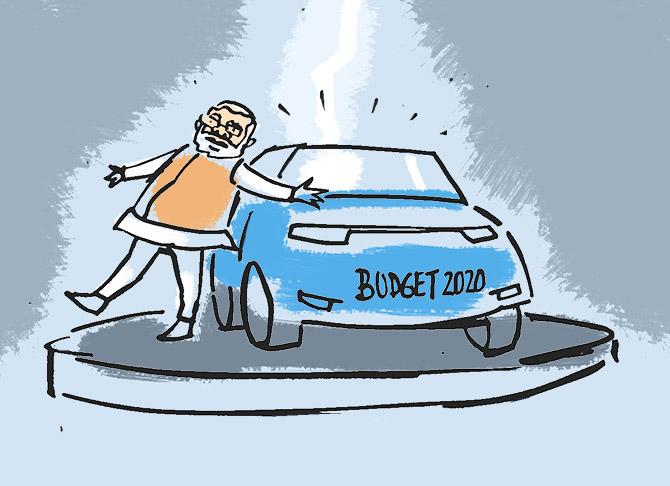 | « Back to article | Print this article |
From Hyundai to Tata Motors, automakers are staring at a bleak future. With no succor provided in the Budget, the pain for companies is likely to continue for the next two quarters.

Automakers in the country started the first month of the year on a weak note amid poor demand and sluggish economic conditions.
Cumulative sales of India’s top six passenger vehicle makers fell 11.3 per cent over the year-ago period, according to the monthly sales volumes data released by the companies.
Passenger vehicle sales in India have been on a decline for a year and half. Last month's volumes, however, are not comparable to January 2019.
Many automakers have stopped production of BS-IV vehicles ahead of switchover to the new emission norms.
They are in the process of increasing production of BS-VI models gradually.
With no succor provided in the Budget, the pain for companies is likely to continue for the next two quarters.
The price increase, which comes ahead of the change in emission norms, is likely to dampen buyer sentiment further and impact sales adversely.
In a post-Budget research note, Dolat Capital said the increased allocation for agriculture and allied activities and rural development (with 25 per cent increase in agriculture credit to farmers and support to small and medium enterprises) augur well for two-wheeler and entry-level car demand.
Industry body, the Society of Indian Automobile Manufacturers (SIAM), was expecting some measures such as an incentive to scrap old vehicles that could have boosted demand in the short term.
With the exception of Maruti Suzuki India, which reported a moderate increase in sales over the last year, dispatches at other automakers fell sharply year-on-year.
Auto companies in India count dispatches to dealers as sales.
The maker of Swift and Wagon R models sold 139,844 units during the month against 139,440 units a year ago.
Hyundai Motor India, the second largest in the pecking order, saw a drop of 8.3 per cent to 42,002 units.
K Ayukawa, managing director (MD) and chief executive officer (CEO) at Maruti said the Budget provides a new direction and creates a stage for the private sector to invest and grow with ease and speed.
“All these will help the auto industry. We also hope the GST Council will look at lower taxation of products like cars, which have a multiplier effect on jobs in the economy.
"The resultant economic growth will more than compensate for the lower tax rates,” he said.
The drop in volumes was sharper for others.
While volumes at Mahindra skidded 17 per cent to 19,797 units, Tata Motors passenger vehicle sales contracted 22 per cent to 13,894 units during the month.
Dispatches at the local arm of Toyota and Honda fell 71 per cent and 41 per cent, respectively, as the companies stopped production of BS-IV models to make way for BS-VI.
The dispatches are likely to improve as they ramp up production of the models with new emission technology.